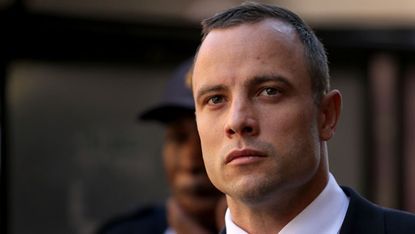Why wasn't Oscar Pistorius convicted of murder?
After a six-month trial, Oscar Pistorius is cleared of murder but convicted of culpable homicide

Oscar Pistorius was today convicted of culpable homicide by Judge Thokozile Masipa after being cleared of murdering Reeva Steenkamp.
The prosecution accused Pistorius of premeditated murder, claiming he had deliberately shot his girlfriend Steenkamp after an argument on Valentine's Day last year.
However, Judge Masipa told the court that the state had failed to prove "beyond reasonable doubt" that Pistorius is guilty of premeditated murder. "There are just not enough facts to support such a finding," she said.
Subscribe to The Week
Escape your echo chamber. Get the facts behind the news, plus analysis from multiple perspectives.

Sign up for The Week's Free Newsletters
From our morning news briefing to a weekly Good News Newsletter, get the best of The Week delivered directly to your inbox.
From our morning news briefing to a weekly Good News Newsletter, get the best of The Week delivered directly to your inbox.
Masipa said the evidence the state offered on the charge was "purely circumstantial".
Based on the objective facts, such as phone records, she accepted the defence's timeline of events that the shots were fired at around 3.12am. This meant that some of the state witnesses who claimed they heard a woman screaming after the time Steenkamp was shot must have been "genuinely mistaken", she said.
The judge also said that the WhatsApp messages between Pistorius and Steenkamp did not "prove anything" and the evidence suggesting Steenkamp had eaten two hours before she died was "inconclusive".
Masipa then turned to the lesser charge of murder. She said there was "no doubt" that when Pistorius fired shots at the door he "acted unlawfully".
However, she said that the evidence does not support the state's case that this was "murder dolus eventualis", a legal term for when the perpetrator foresees the possibility of his action causing death and persists regardless.
Masipa accepted that Pistorius believed Steenkamp was in the bedroom, noting that this part of his account had remained consistent since the moments after the shooting. It is "highly improbable the accused would have made this up so quickly", she said.
She described Pistorius as a "very poor" and "evasive" witness, but said it did not mean he was necessarily guilty. "Clearly he did not subjectively foresee this as a possibility that he would kill the person behind the door – let alone the deceased – as he thought she was in the bedroom," she said.
Yesterday, some legal experts suggested that the state might be able to appeal the murder ruling. Masipa explained why Pistorius did not foresee that he would kill Steenkamp, but did not "explain convincingly" why she believed he did not foresee that he would have killed the perceived intruder, says Pierre De Vos, who teaches constitutional law at the University of Cape Town.
Writing in South Africa's Daily Maverick, De Vos says: "Given all the evidence presented in court about Pistorius's knowledge of guns and what the bullets he used would do to a person, it is unlikely in the extreme that Pistorius did not foresee that the person behind the door (who he might have thought was an intruder) would be killed."
Today, Masipa offered a legal explanation as to why she could only convict Pistorius on culpable homicide rather than murder. A "reasonable" person with Pistorius's disabilities would have foreseen that shooting into the door may have killed the person inside, she said. However, South African law warns against automatically assuming that because a perpetrator "should have" foreseen the consequences of his actions that he actually did.
She pointed to JM Burchell's General Principles of Criminal Law, which states that "the courts have warned against any tendency to draw the inference of objective foresight too easily". Following previous cases, the courts have been told to "guard against proceeding too readily from 'ought to have foreseen' to 'must have foreseen'".
The onus was on the state to prove beyond reasonable doubt that Pistorius foresaw the fatal consequences of his actions when he shot at the door. Masipa said the prosecution failed to do so.

Continue reading for free
We hope you're enjoying The Week's refreshingly open-minded journalism.
Subscribed to The Week? Register your account with the same email as your subscription.
Sign up to our 10 Things You Need to Know Today newsletter
A free daily digest of the biggest news stories of the day - and the best features from our website
-
 Florida GOP chair says prurient sex and rape allegations won't force him out
Florida GOP chair says prurient sex and rape allegations won't force him outSpeed Read Republicans are calling on Christian Ziegler, half of a Florida GOP power couple, to step down after a police report revealed a sexual battery allegation and a consensual threesome
By Peter Weber, The Week US Published
-
 Dr Bush wins mullet of the year contest
Dr Bush wins mullet of the year contestTall Tales And other stories from the stranger side of life
By Chas Newkey-Burden, The Week UK Published
-
 Crossword: December 4, 2023
Crossword: December 4, 2023The Week's daily crossword
By The Week Staff Published
-
 Oscar Pistorius: what his life will be like after prison
Oscar Pistorius: what his life will be like after prisonWhy everyone's talking about Former sprinter granted parole a decade after killing girlfriend Reeva Steenkamp
By Keumars Afifi-Sabet, The Week UK Published
-
 Death of first non-binary judge in Mexico instils fear in LGBTQ+ community
Death of first non-binary judge in Mexico instils fear in LGBTQ+ communityUnder the Radar Jesús Ociel Baena's suspected murder reveals dangers to transgender and non-binary people
By Harriet Marsden, The Week UK Published
-
 Lukoil: third top executive dies suddenly at company that criticised Putin's war
Lukoil: third top executive dies suddenly at company that criticised Putin's warSpeed Read The oil giant said its chairman Vladimir Nekrasov died of 'acute heart failure'
By Richard Windsor, The Week UK Published
-
 Belgian police shoot dead man in search for Brussels terror suspect
Belgian police shoot dead man in search for Brussels terror suspectSpeed Read The man is suspected of killing two Swedish nationals and wounding another in shooting spree
By The Week Staff Published
-
 Gangs, guns and bombs: Sweden's 'crisis of violence'
Gangs, guns and bombs: Sweden's 'crisis of violence'Why Everyone's Talking About Surge in bomb attacks and gun violence has led government to call on military support
By The Week Staff Published
-
 Dodgy cash disguised as sandwiches
Dodgy cash disguised as sandwichesTall Tales And other stories from the stranger side of life
By Chas Newkey-Burden Published
-
 Argentinian police arrest biggest online distributor of Nazi propaganda
Argentinian police arrest biggest online distributor of Nazi propagandaSpeed Reads Officials seized hundreds of texts glorifying Adolf Hitler, denying Holocaust and bearing swastikas
By Harriet Marsden Published
-
 How North Korean hackers stole billions in crypto
How North Korean hackers stole billions in cryptoSpeed Read Pyongyang-backed cyber gangs use ‘mixers’ to launder their criminal proceeds
By Chas Newkey-Burden Published










